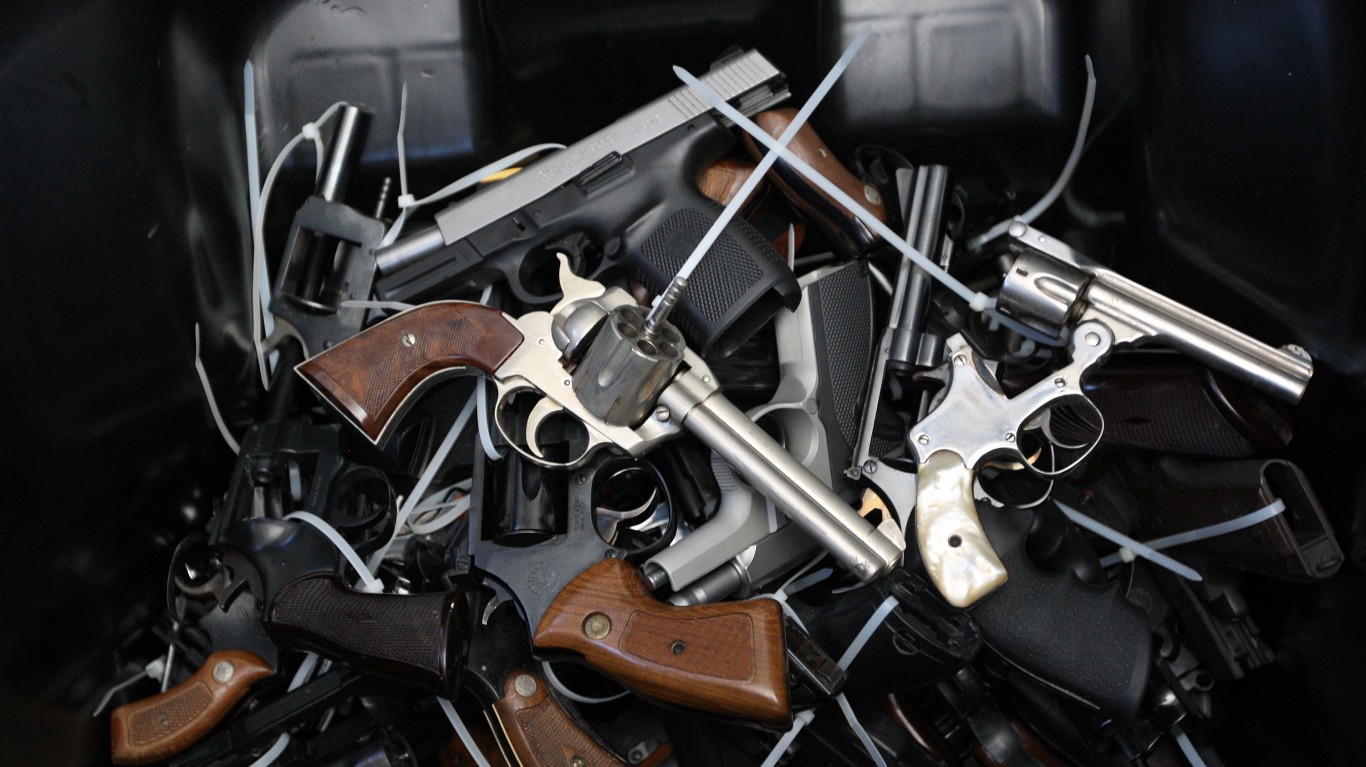
Firearms have become one of the most politically contentious issues in the United States in recent decades. As active shooter incidents have become increasingly common, exactly who should be allowed to own guns, and the specific types of guns available to consumers, have become subjects of on-going debate in this country.
While increasingly controversial, firearms have been fundamental to American identity since the earliest days of the republic. A constitutional right, gun ownership was all but essential for families settling the North American frontier, from the Colonial era through the period of westward expansion. Necessary not only as a means of self defense, guns were also needed for hunting and providing food.
With fully stocked grocery stores and armed law enforcement in the United States of today, firearms are no longer the practical necessity they once were. As a result, the majority of Americans do not own a gun. Still, the legacy of the role firearms played in making the country what it is looms large, and today, guns wield outsized influence on American culture, values, and politics.
Using data from a range of surveys, public opinion polls, government databases, legal documents, and historical archives, 24/7 Tempo identified 37 amazing facts about guns in America.
Click here to learn amazing facts about guns in America
When it comes to firearms, the United States is a global outlier. One of only three countries in which gun ownership is a constitutional right, the U.S. is also the only country in the world with more guns than people. (Here is a look at America’s largest gun makers.)
The United States also stands out – particularly among highly-developed nations – for rates of gun violence and mass shooting incidents. While gun control laws at the federal level are limited, many states have attempted to reduce rates of gun violence through legislation. As a result, guns are far harder to obtain in some states than others, and perhaps not surprisingly, rates of gun ownership also vary considerably from state to state. (Here is a look at the states where the most Americans own guns.)
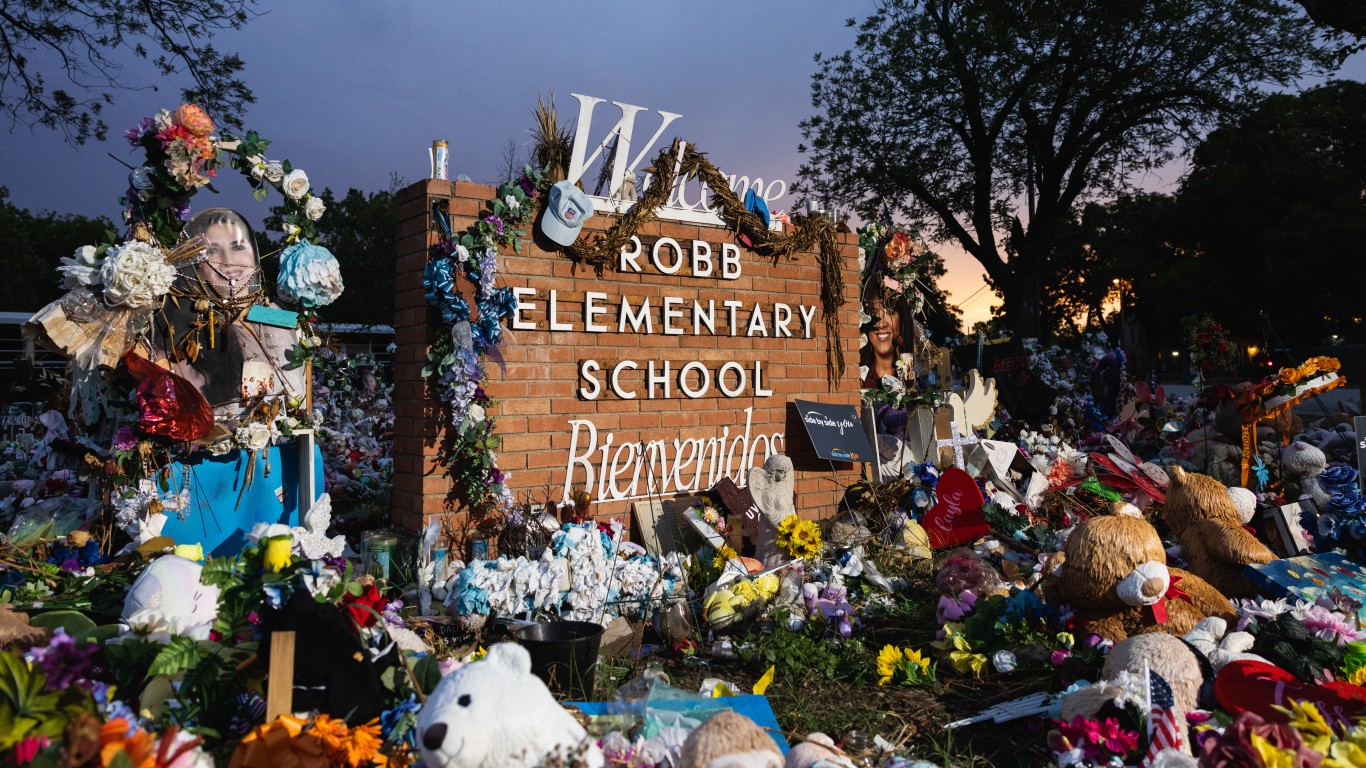
There is no universally accepted definition for what constitutes a mass shooting
The FBI – the top investigatory and law enforcement agency in the country – offers precise definitions as to what constitutes “mass murder” and “active shooter incidents.’ It does not, however, define the term “mass shooting.” In the absence of a single, authoritative description, other groups have established their own guidelines.
The widely-cited non-profit organization Gun Violence Archive, for example, defines a mass shooting as an incident in which four or more people are shot, not including the shooter. According to the GVA, there were 646 such incidents in the United States in 2022.
[in-text-ad]
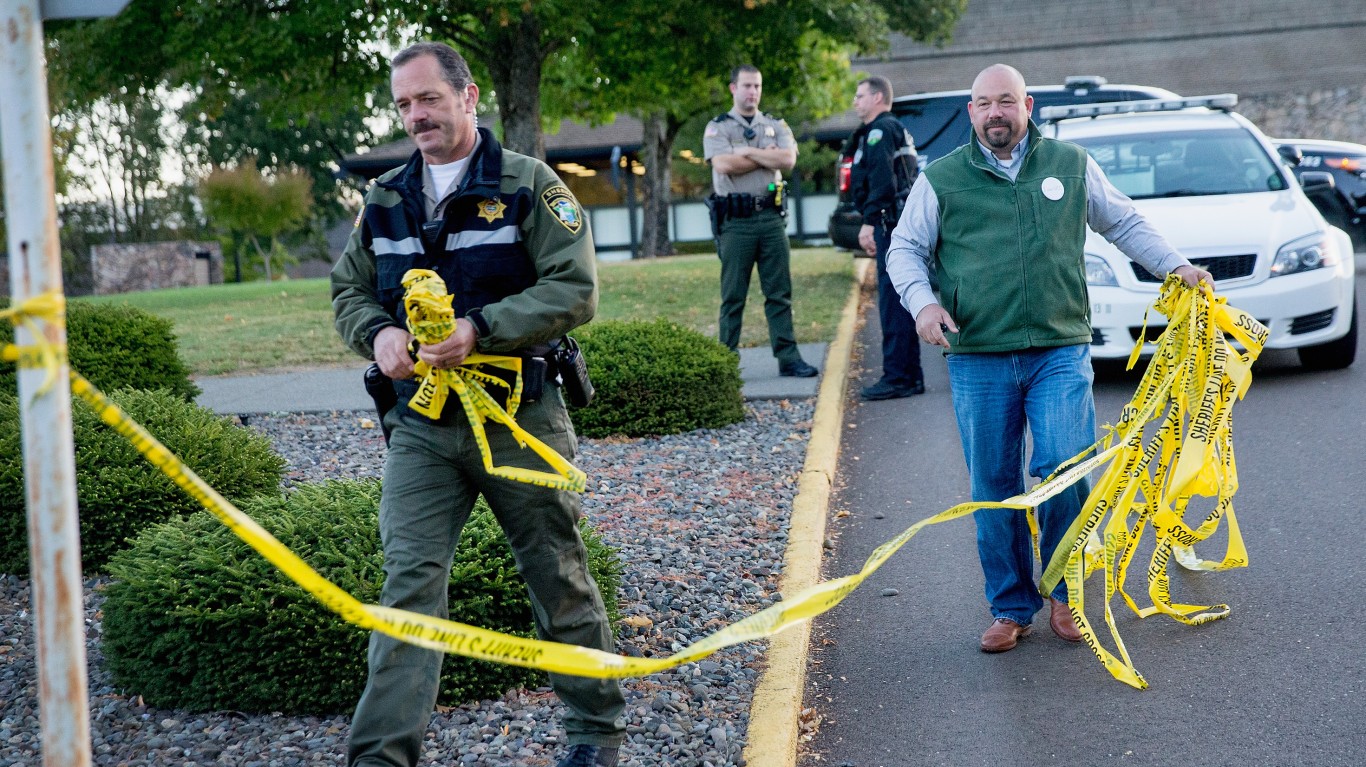
In 2021, 81% of murders involved firearms, the highest since 1968
Rates of gun violence are on the rise in the United States. According to data from the Centers for Disease Control and Prevention, there were 26,031 murders in the U.S. in 2021. Of those, 20,958 – or 81% – involved a firearm. Based on CDC data going back to 1968, 2021 was the worst year for gun homicide in the U.S., both in total number of incidents, and as a share of all homicides.
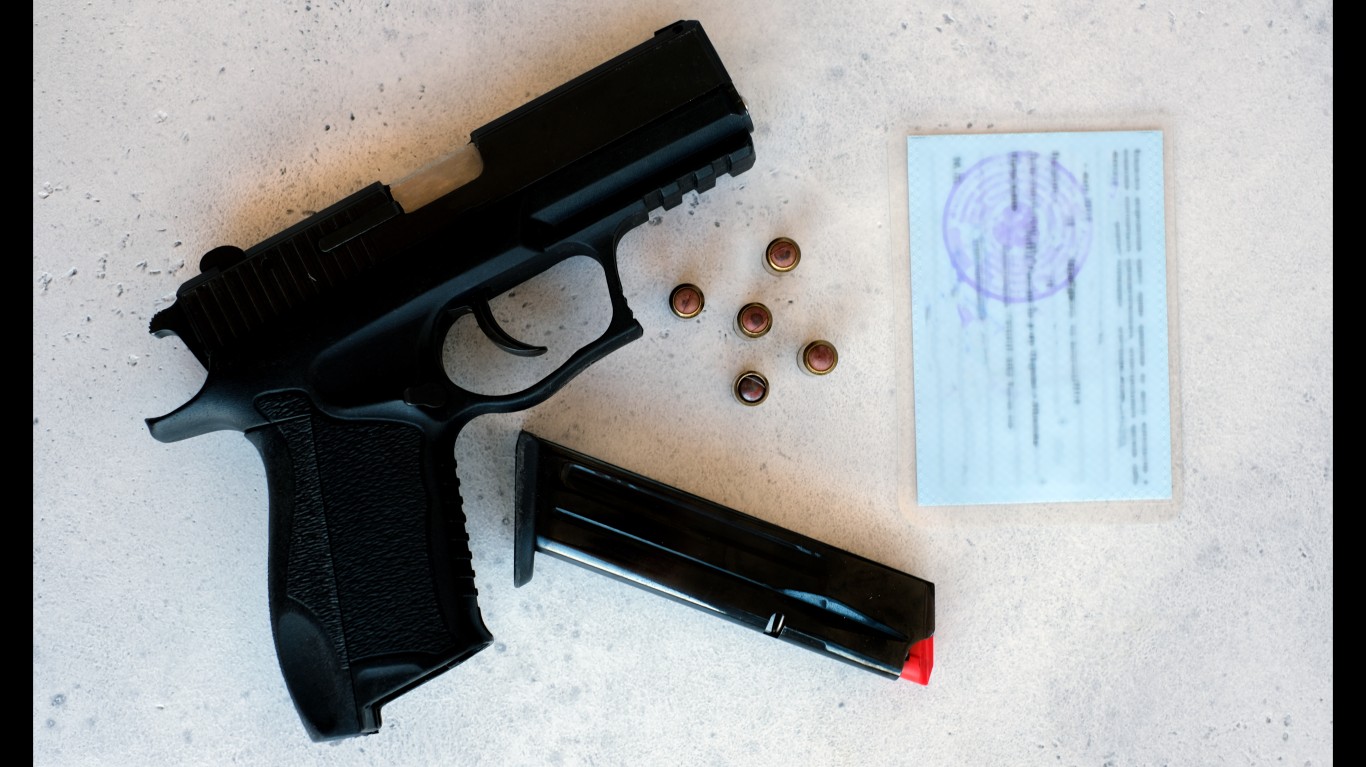
All states allow concealed carry, and most don’t require a permit
Concealed carry is legal to some degree in every state. But in the last decade, over a dozen states have previously passed laws allowing legal gun owners to carry a concealed firearm in public places without a special permit – not including three states enacting such laws in 2023. In these and other states, concealed weapons, typically semi-automatic pistols or revolvers, can be carried under clothing, or in backpacks or purses.
Currently, 22 states require a permit to carry a concealed weapon – not counting Louisiana, a state where permitless concealed carry is allowed only for those who have served in the military.
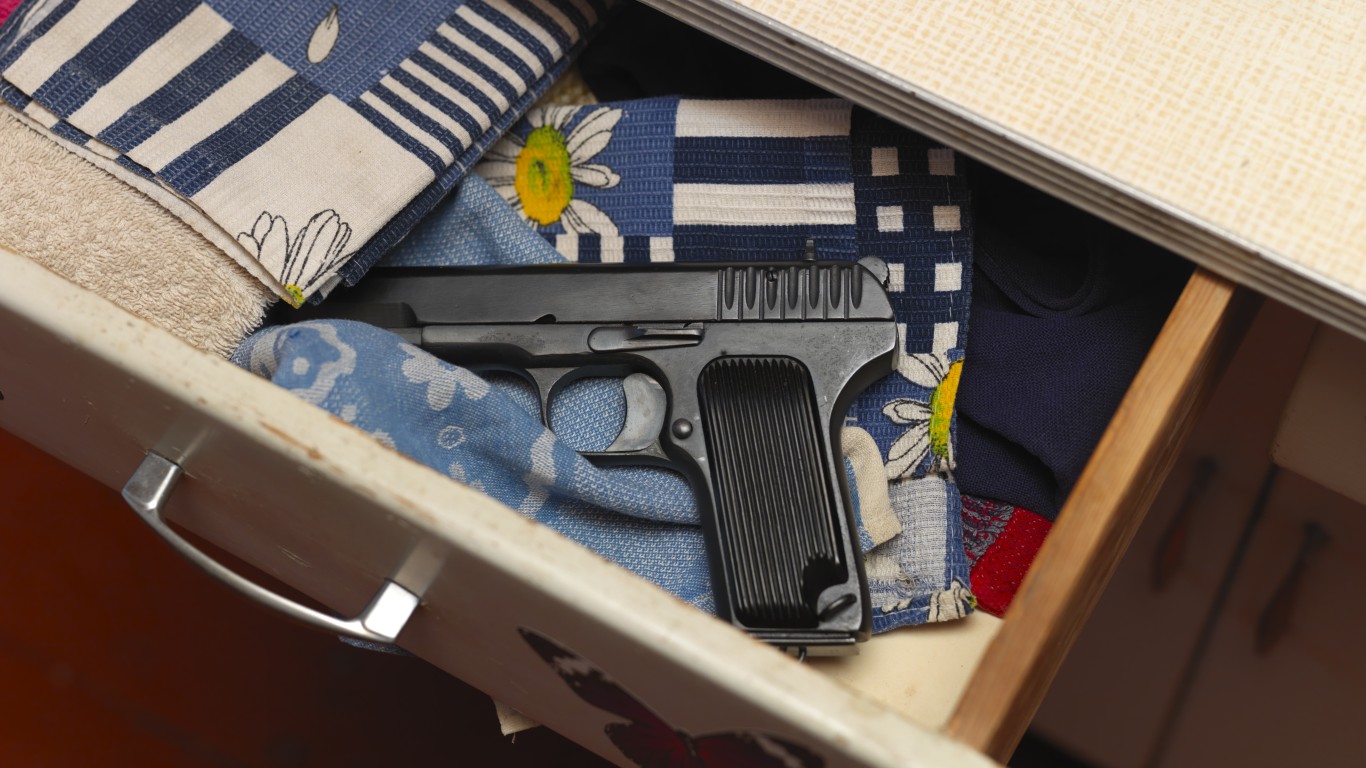
In 2020, the number of children under the age of 11 who were killed or injured by guns increased 44%
Recently, firearms have become the leading cause of death for children in the United States. In 2020, the number of children age 11 and younger killed by firearms hit 1,001, according to the Gun Violence Archive, a 44% increase from 2019, when 696 children in the same age group were shot to death.
[in-text-ad-2]
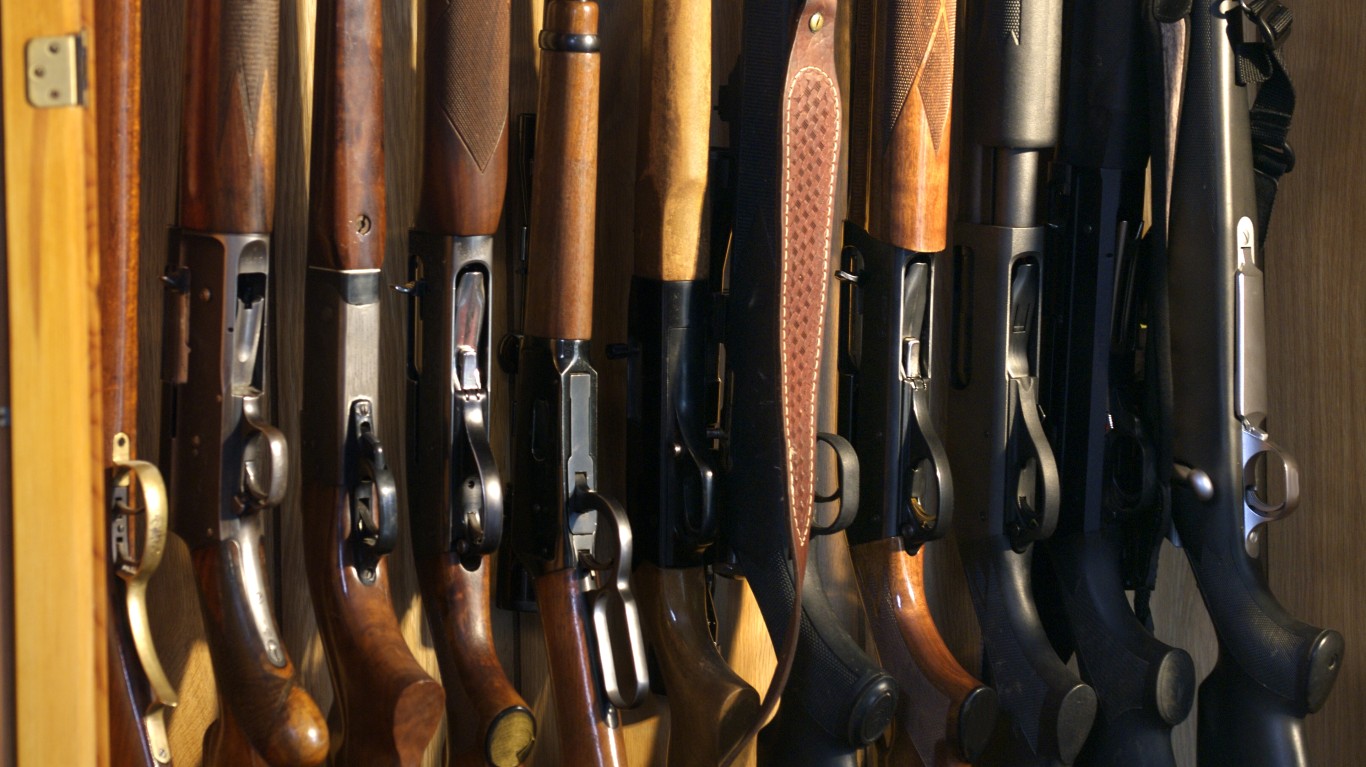
One in three American adults owns a gun
The U.S. is the only country in the world with more civilian-owned guns than people. However, the majority of Americans do not own a firearm. According to a report published by the Pew Research Center in 2021, four-in-ten American adults have a gun in their household, and only three-in-report personally owning a firearm.
U.S.: 5% of global population, 45% of private firearms
America has more civilian-owned firearms than any other country in the world – and by a wide margin. The United States accounts for just 5% of the global population, but is also home to 45% of the world’s privately owned guns, according to 2018 data from the Swiss company Small Arms Survey.
[in-text-ad]

U.S. has highest homicide rate among developed nations
Though several Latin American countries have higher gun death rates than the United States, the U.S. is an outlier among developed nations, with far more gun deaths per capita than countries like Australia, Canada, France, Germany, and Spain.
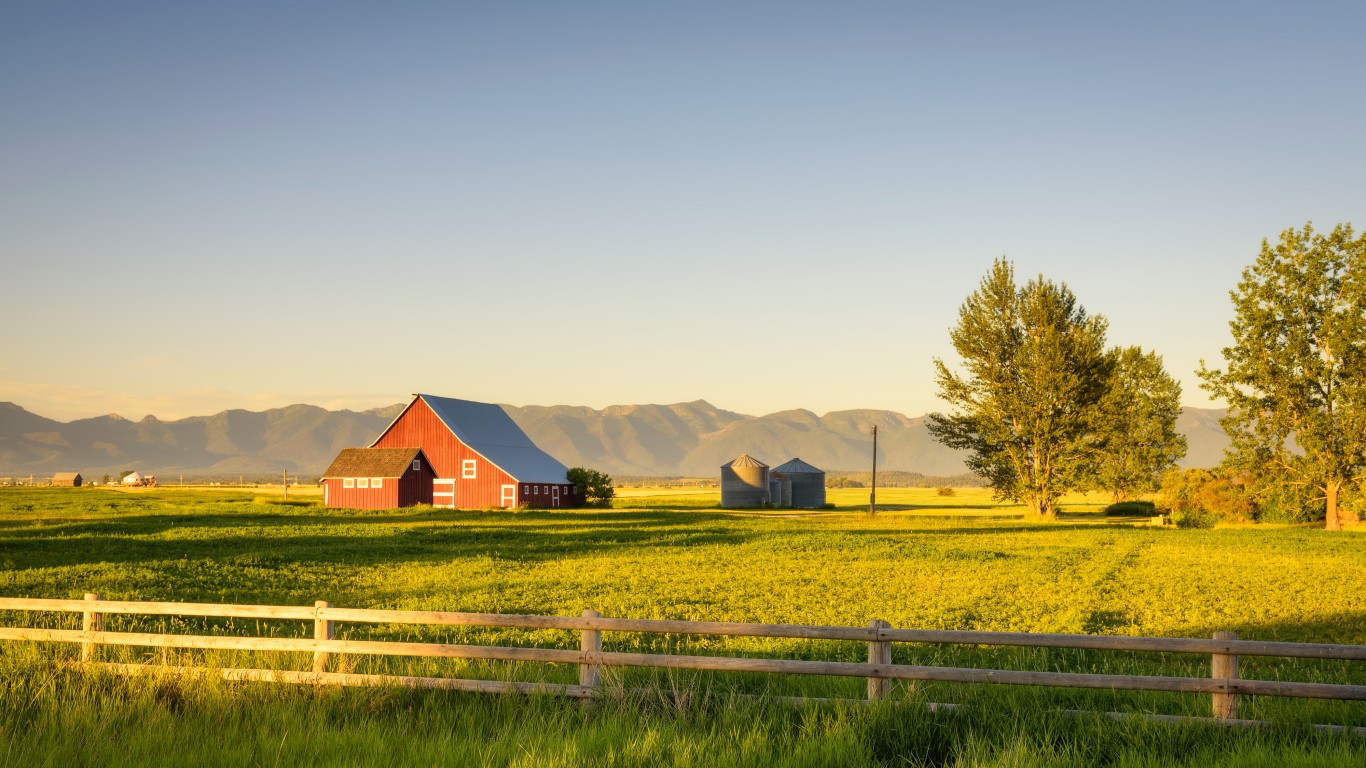
Firearm ownership: Rural (41%), suburbs (29%), cities (20%)
Geography appears to play a considerable role in firearm ownership rates in the United States, with more than twice as many gun owners in rural America than in the cities.
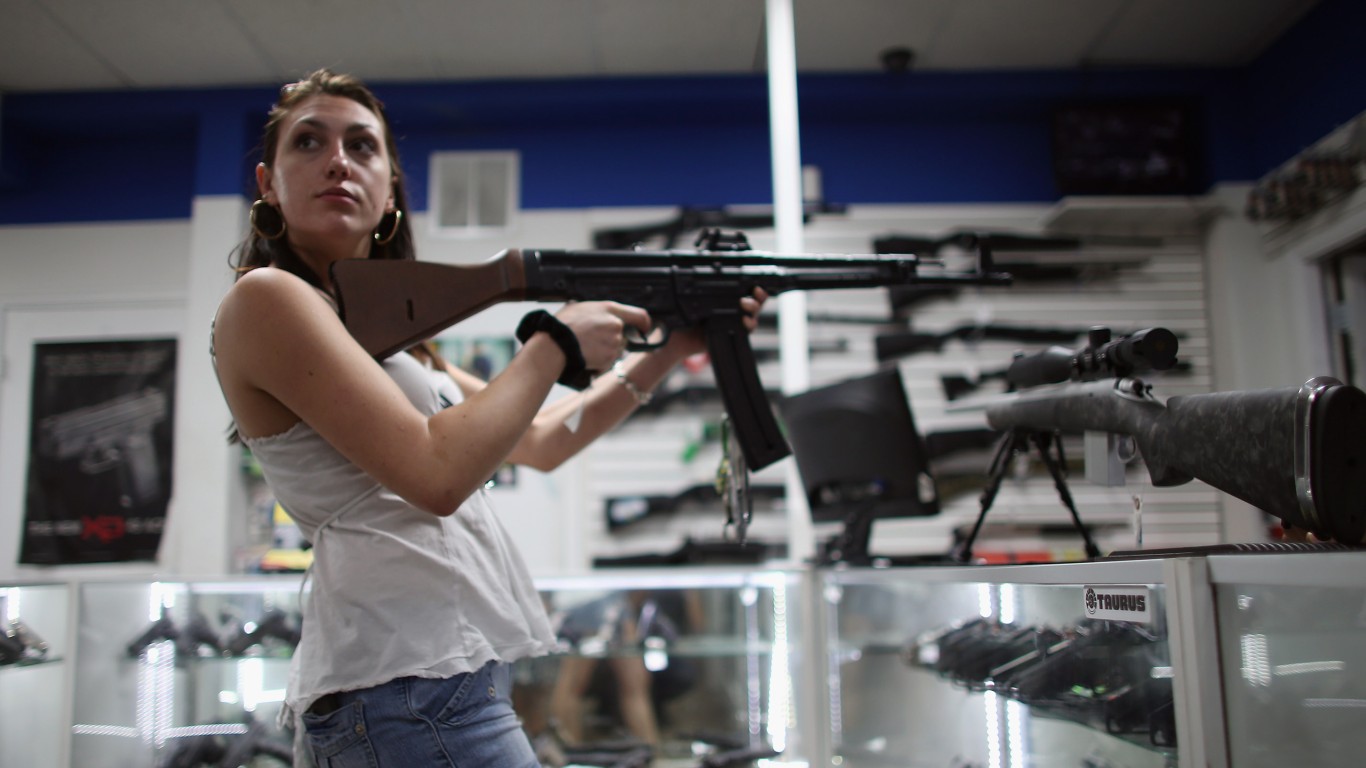
In 2020, background checks for gun purchases surged
In the early days of the COVID-19 pandemic, and amid widespread unrest over police brutality, FBI background checks for firearm purchases spiked dramatically. There were 9.9 million total background checks in the first five months of 2020, up 69% from the same period in 2019. Meanwhile, background checks for handguns specifically spiked by 80%.
[in-text-ad-2]

2020 saw record gun purchases with nearly 23 million firearms bought
With a spike in background checks, 2020 was a record breaking year for firearm sales in the United States. According to estimates from Small Arms Analytics, a consulting firm based in Greenville, South Carolina, Americans bought nearly 23 million guns in 2020 – considerably higher than the previous record of 15.7 million in 2016.

63% of those who own guns have them for protection
Americans own guns for a wide variety of reasons – whether for target shooting, hunting, collecting, or simply because they can. But a 2019 Gallup poll found that personal safety/protection is by far the most common justification, cited by 63% of gun owners.
[in-text-ad]
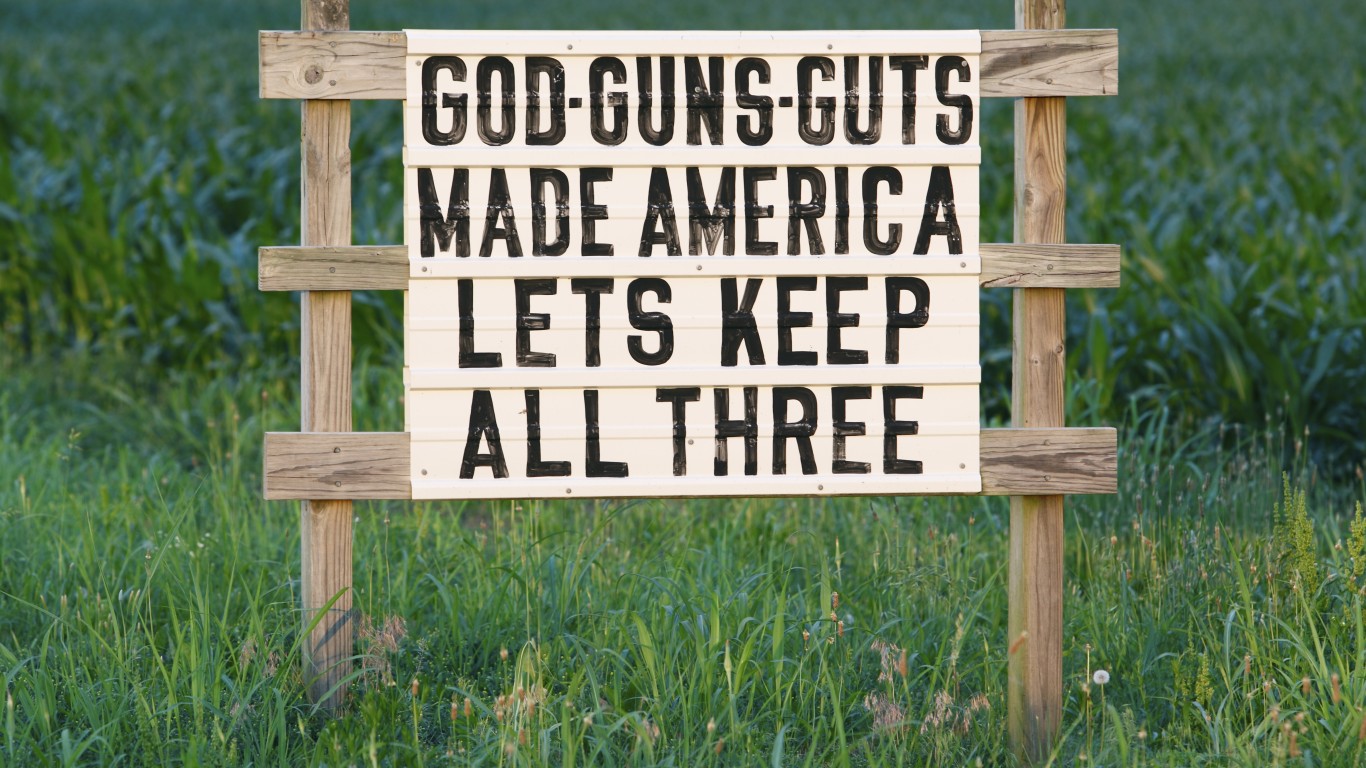
74% of gun owners deem the right to own a gun essential for their personal sense of freedom
Along with Mexico and Guatemala, the United States is one of only three countries in the world where gun ownership is a constitutional right. And attitudes towards firearms among American gun owners reflect the importance of that right. Nearly three quarters of gun owners in the United States – 74% – say that the right to gun ownership is essential to their own sense of personal freedom, according to a poll from the Pew Research Center.
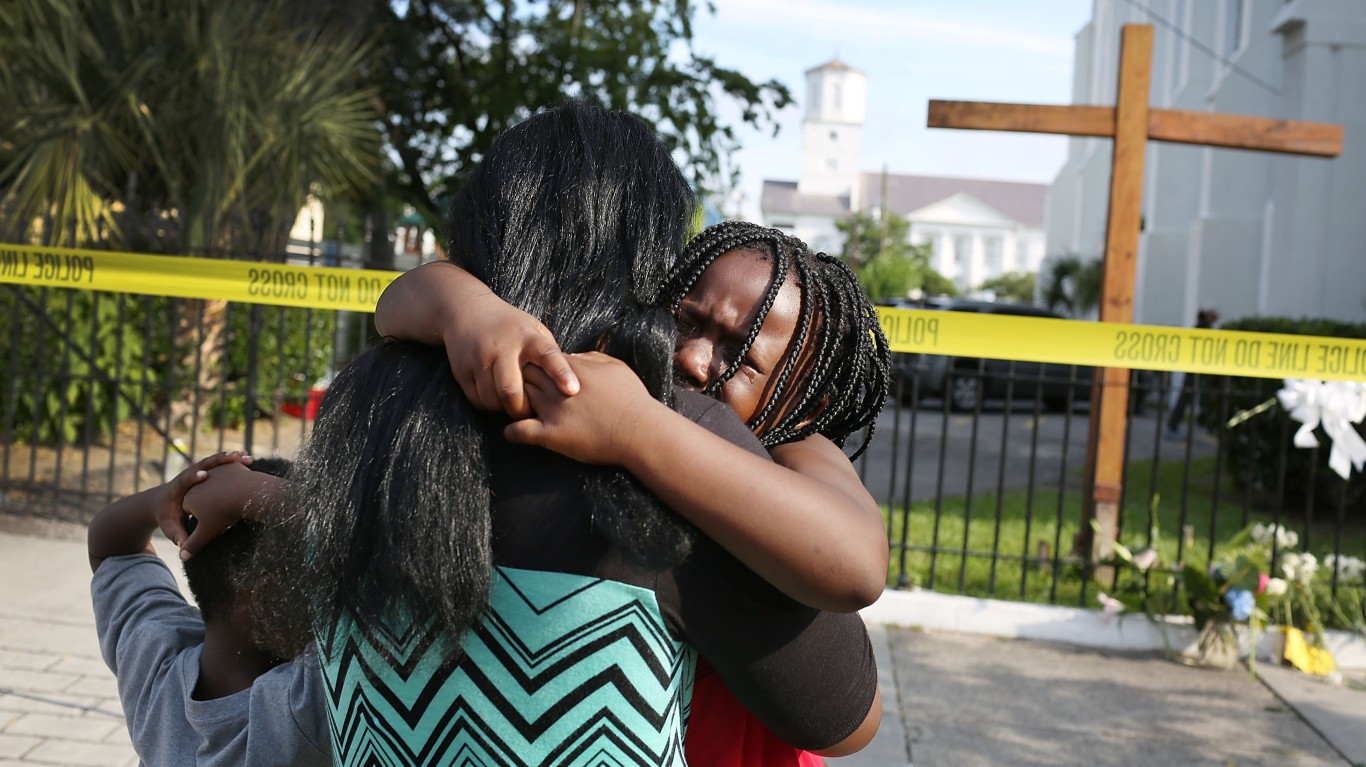
82% of Black adults say gun violence is a big problem
Gun homicides are 12 times more likely to impact Black Americans than white Americans. And attitudes towards gun violence in the United States along ethnic and racial lines reflect this disparity. A 2021 poll from the Pew Research Center found that 82% of Black adults say gun violence is a very big problem, compared to 58% of Hispanic adults, and just 39% of white adults.
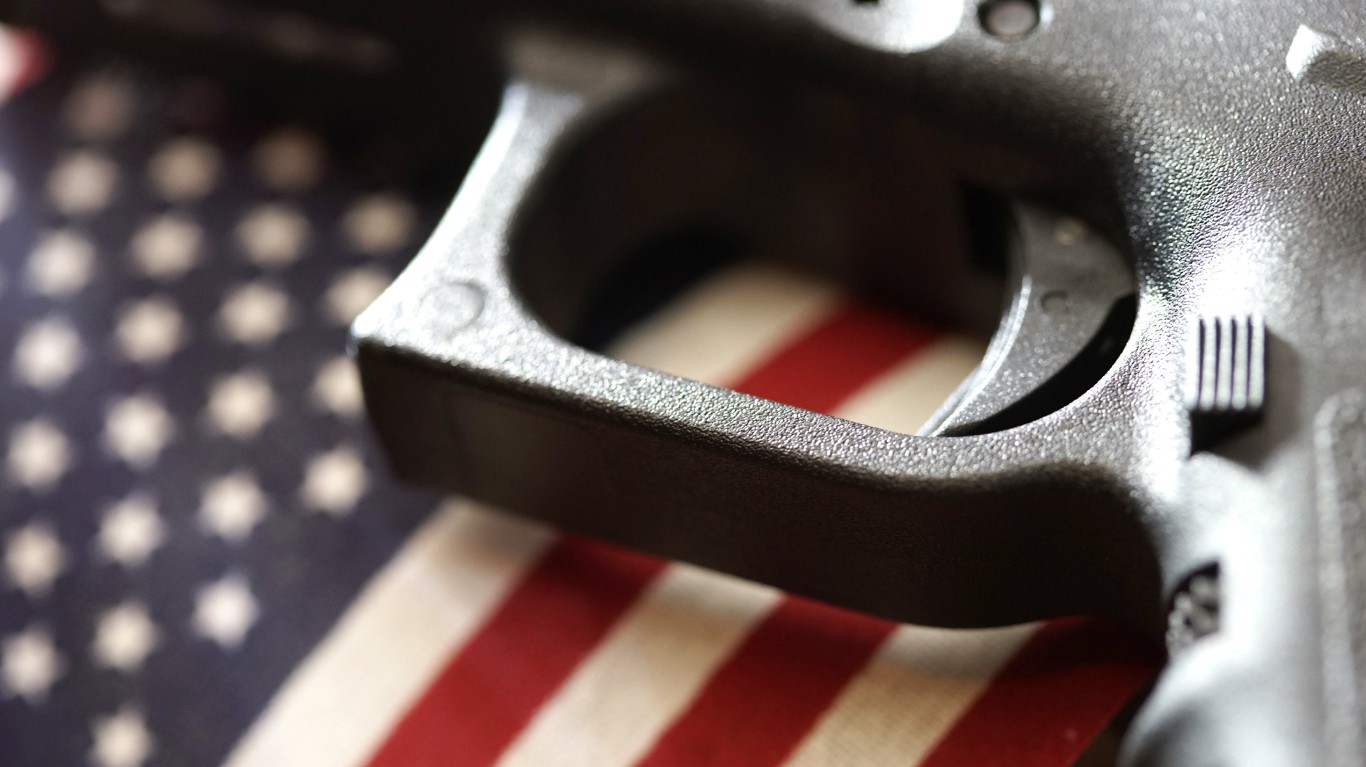
53% of Americans support stricter gun laws, down from 60% in 2019
While incidents of gun violence are on the rise in the United States, Americans are losing interest in gun control reform. A recent Pew survey found that only 53% of Americans wanted stricter gun laws in 2021, down from 60% in 2019.
[in-text-ad-2]
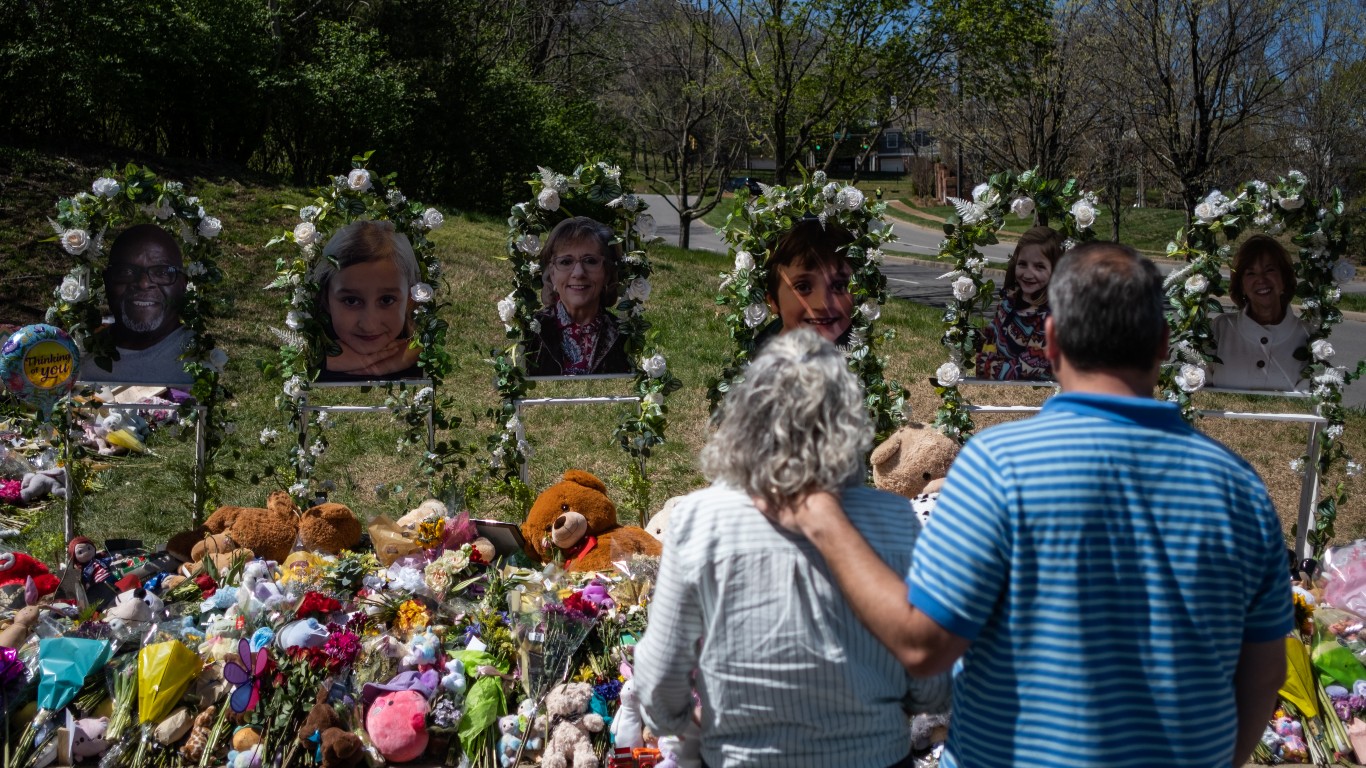
49% believe stricter gun access would reduce mass shootings
Guns are a politically divisive issue in the United States, particularly around the question of how to address the pressing issue of mass shootings. A 2021 Pew poll found that 49% of the public agree that tighter restrictions on gun ownership would reduce mass shootings. Meanwhile, 42% of Americans say restrictions would make no difference, and 9% think restrictions would lead to more mass shootings.
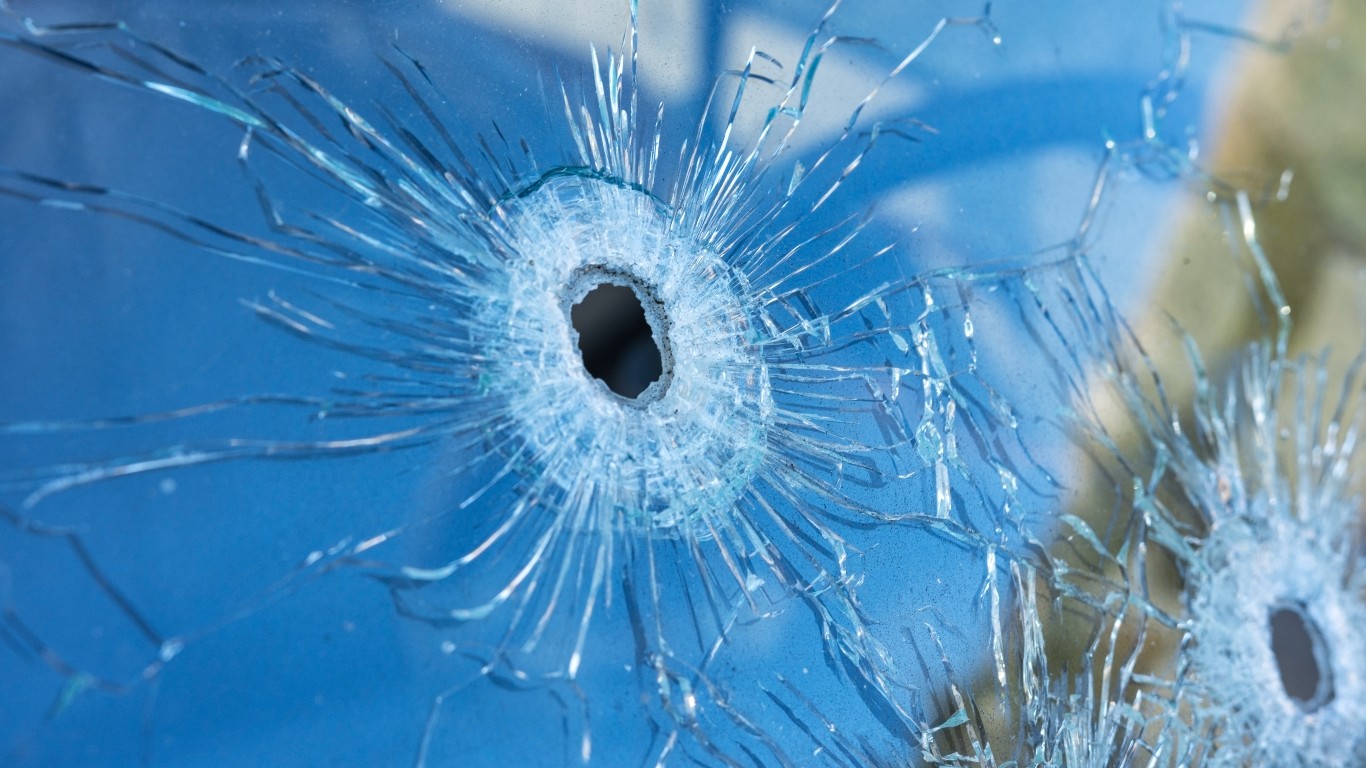
44% of Americans know someone who has been shot
Gun violence has personally impacted a considerable share of the U.S. population. While only about 3% of American adults have personally been shot – either accidentally or intentionally – a 2017 Pew poll found that 44% of Americans know someone who has.
[in-text-ad]
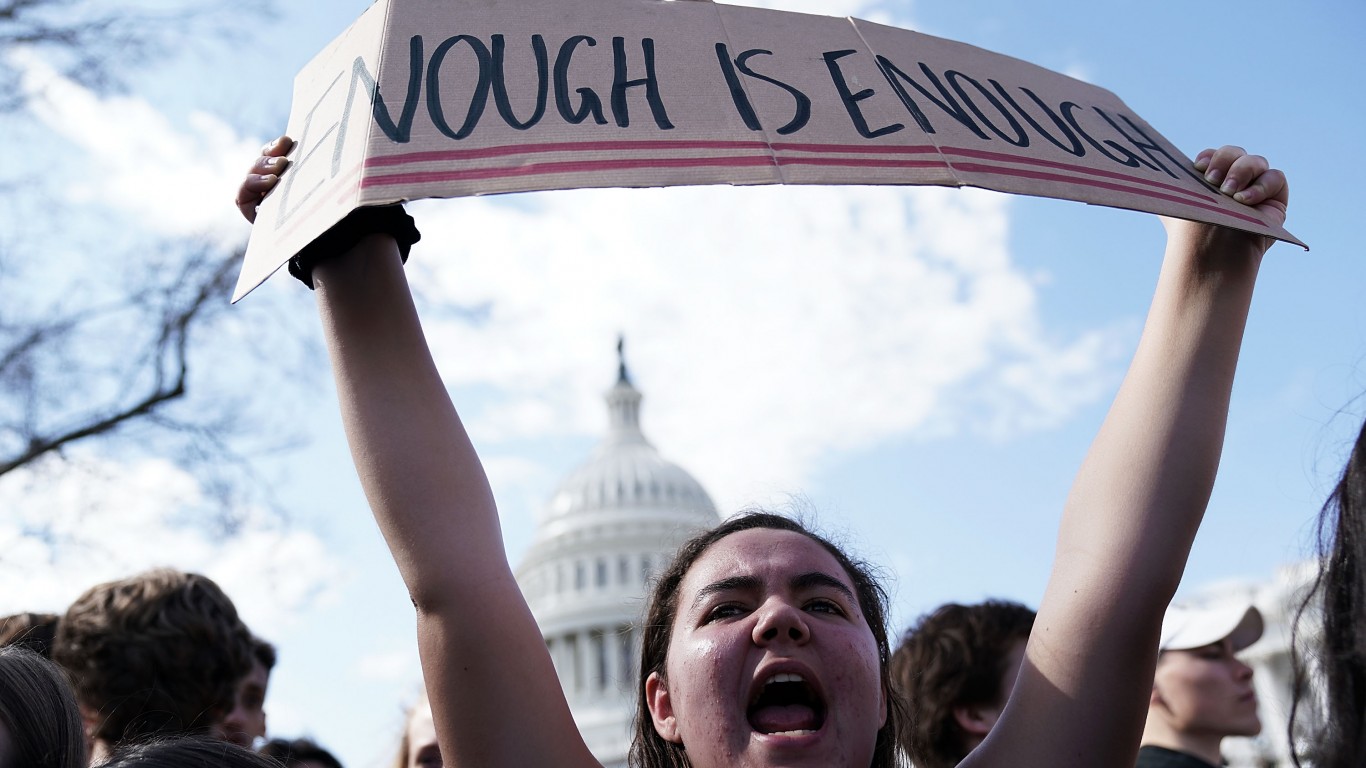
The public is divided on gun ownership’s impact on crime
The relationship between firearms and crime is complicated politically, as the public is divided on the issue. A recent Pew survey found that 31% of Americans think crime rates would fall if more Americans were armed. Meanwhile, 34% of the population think crime would rise with gun ownership, and another 34% think more guns on the street would not impact crime rates.

There’s a partisan divide on gun control
Political party, perhaps more than any other distinction, is the best indicator of attitudes towards guns in the United States. An estimated 81% of Democrats and left-leaning independents say gun laws should be stricter than they currently are, compared to just 20% of Republicans and right-leaning independents, according to a recent Pew survey.

In 2021, the US saw the highest total number of gun deaths
Deaths resulting from firearm related injuries hit an all-time high in 2021. According to the Centers for Disease Control and Prevention, 48,830 Americans were killed by guns that year – whether through homicide, suicide, or accidents. The record-breaking year for gun deaths came immediately after the year firearm sales hit their highest level in U.S. history.
[in-text-ad-2]
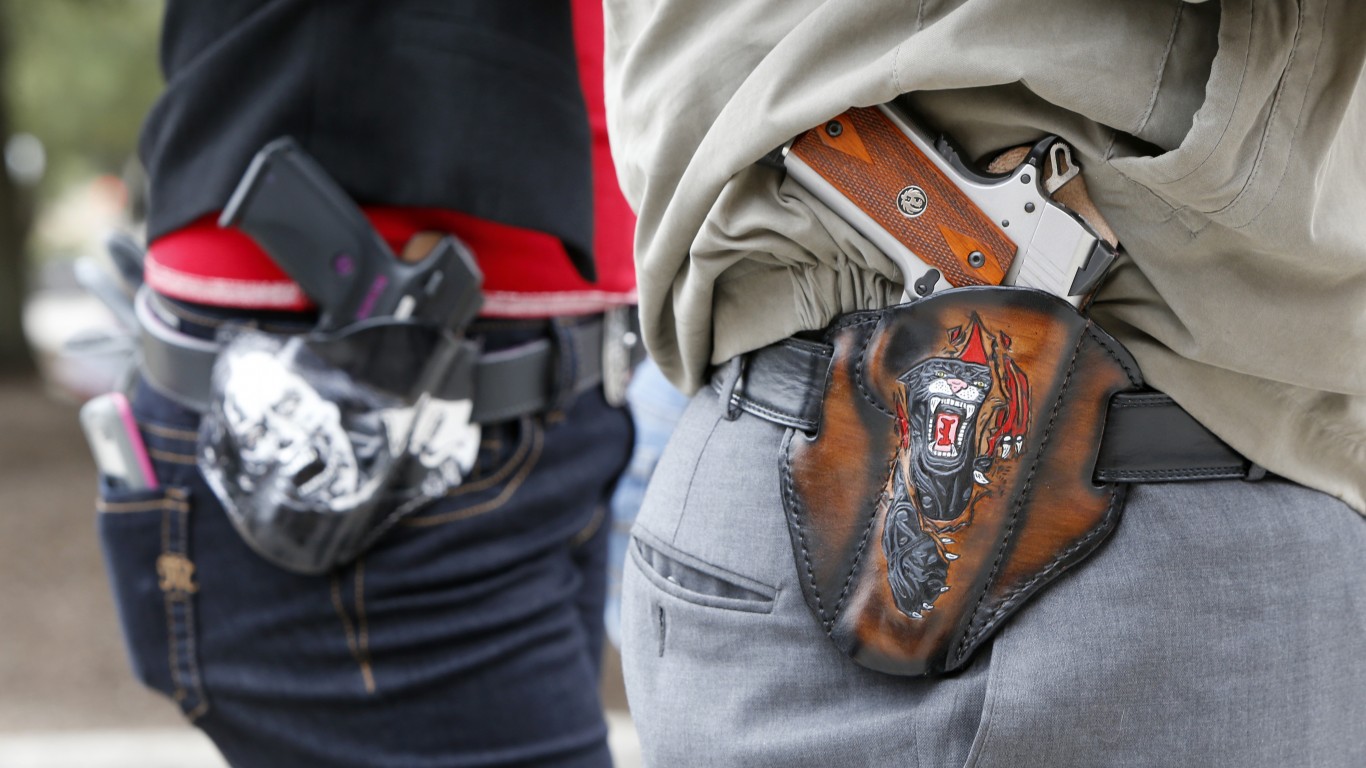
30 states allow lethal force without duty to retreat, even outside of home
A majority of states – 30 out of 50 – have so-called “stand your ground” laws on the books, meaning individuals are not required to attempt to de-escalate and remove themselves from a dangerous situation, even in public. In these states, residents carrying guns can use them as a first resort in virtually any circumstance in which they feel they or others are at risk of serious bodily harm.
According to the Giffords Law Center, a gun violence prevention organization, as many as 50 people are killed every month in the United States because of these laws.

71% of rural Republicans support arming teachers in K-12 schools, while of 56% urban Republicans do
While Republicans generally favor expanding gun rights more than other Americans, there are divides within the party, and some of them appear to be influenced by place of residence. For example, 71% of Republicans in rural areas support allowing teachers to carry guns in K-12 schools, compared to just 56% of Republicans in urban areas.
[in-text-ad]
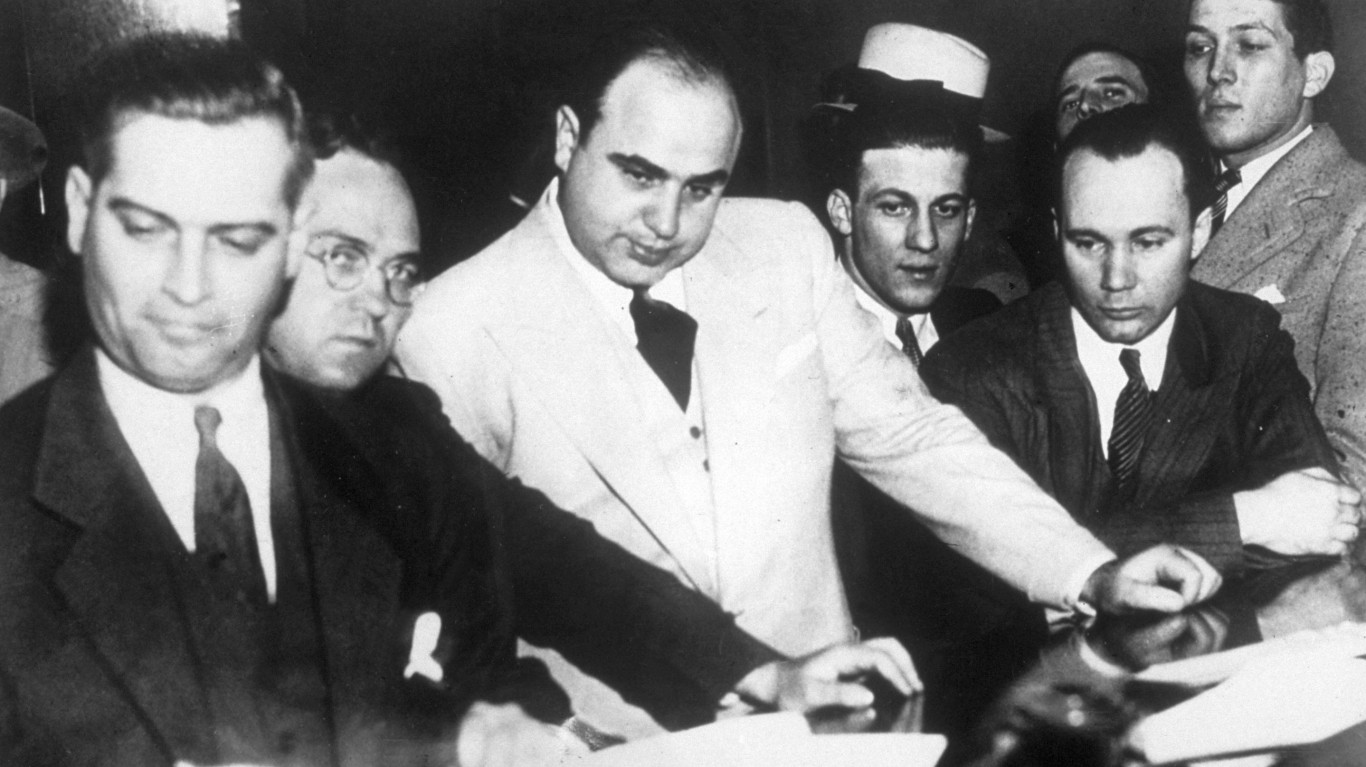
Prohibition led to gun violence, prompting federal legislative action
Gun violence in the Prohibition Era, often carried out by gangsters like Al Capone, prompted President Roosevelt to sign the National Firearms Act into law in 1934. The law, which remains in effect, and has been expanded over time, imposed a tax on fully-automatic weapons to discourage their sale. Today, civilian ownership of new fully automatic weapons is effectively banned in the United States.

States with more guns have higher gun deaths (homicides, suicides)
Though millions of Americans believe more guns will lead to lower rates of crime and violence, the data tells a different story. Using data from the Centers for Disease Control and Prevention, a 2016 study published by Mother Jones found that states with more guns have higher rates of gun violence, particularly homicides and suicides.
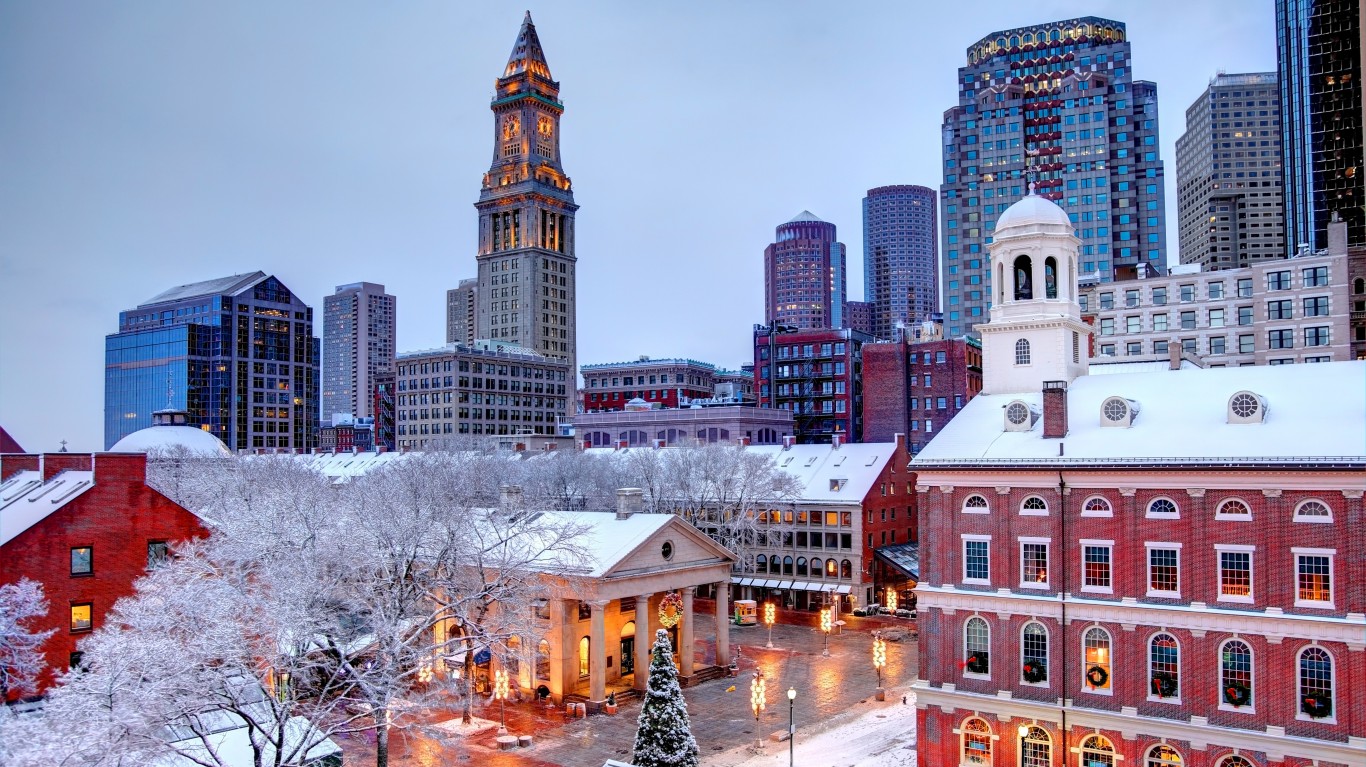
Northeast states have strict gun laws, fewer owners and licenses
The Northeast and Mid-Atlantic regions have a high concentration of states with strict gun restrictions. States like Connecticut, Massachusetts, New Jersey, New York, and Rhode Island have some of the toughest gun laws in the country. Among these states, the share of households that own a firearm ranges from 8% to 18% – some of the lowest for any state in the country, according to a 2020 RAND Corporation study.
[in-text-ad-2]
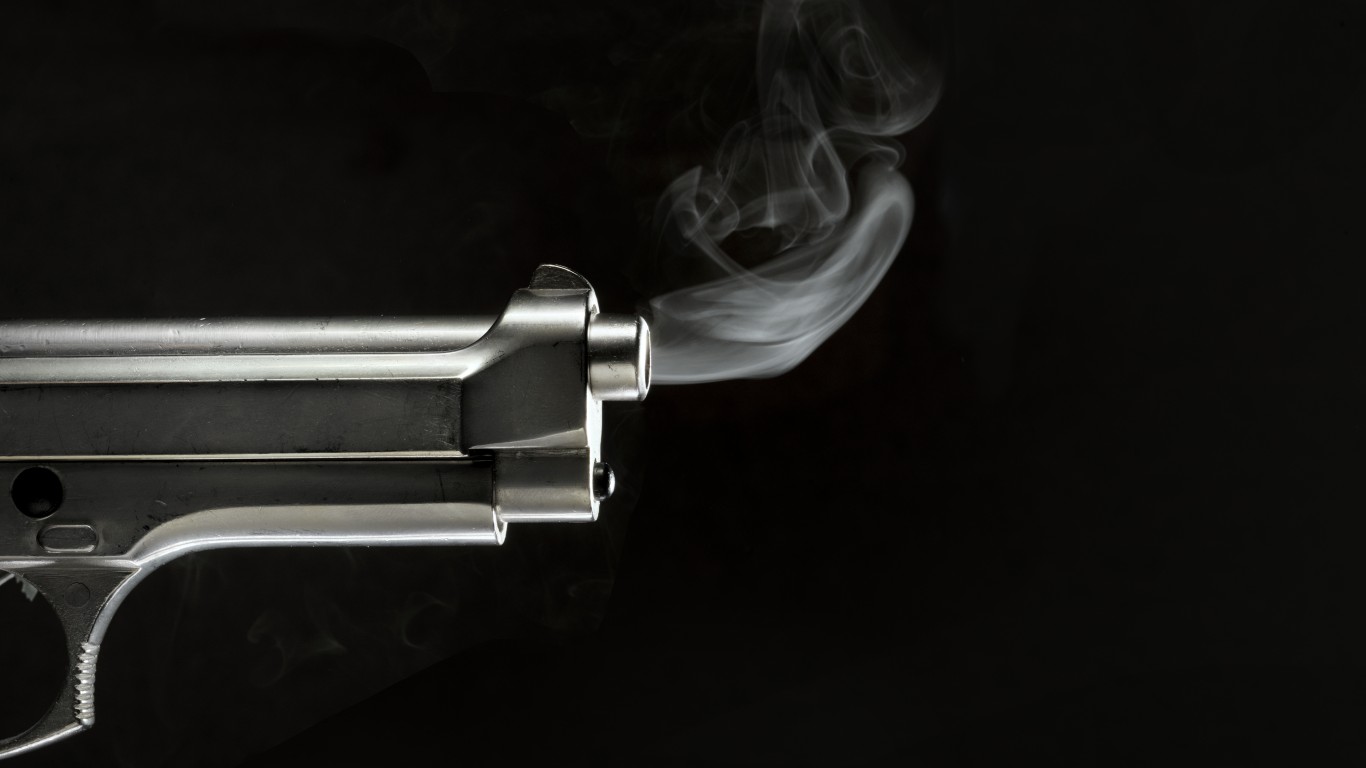
Fewer strict gun laws correlate with higher firearm deaths per capita
Restrictive firearm laws are generally designed to keep gun violence and keep guns out of the wrong hands. And data shows that many of these laws appear to be effective. According to a study conducted by the non-profit organization Everytown for Gun Safety, states with strong gun control laws tend to have lower firearm death rates, while death rates tend to be far higher in states that have adopted a hands off approach to gun control.

Firearm injuries are a leading cause of deaths for the young in the US
Injuries resulting from gunshot wounds are the second leading cause of death among children and adolescents in the United States. According to a 2016 study from The New England Journal of Medicine, firearm deaths – including homicides, suicides, and accidents – accounted for 15% of deaths among American children and adolescents, trailing only motor vehicle accidents, which accounted for 20%.
[in-text-ad]
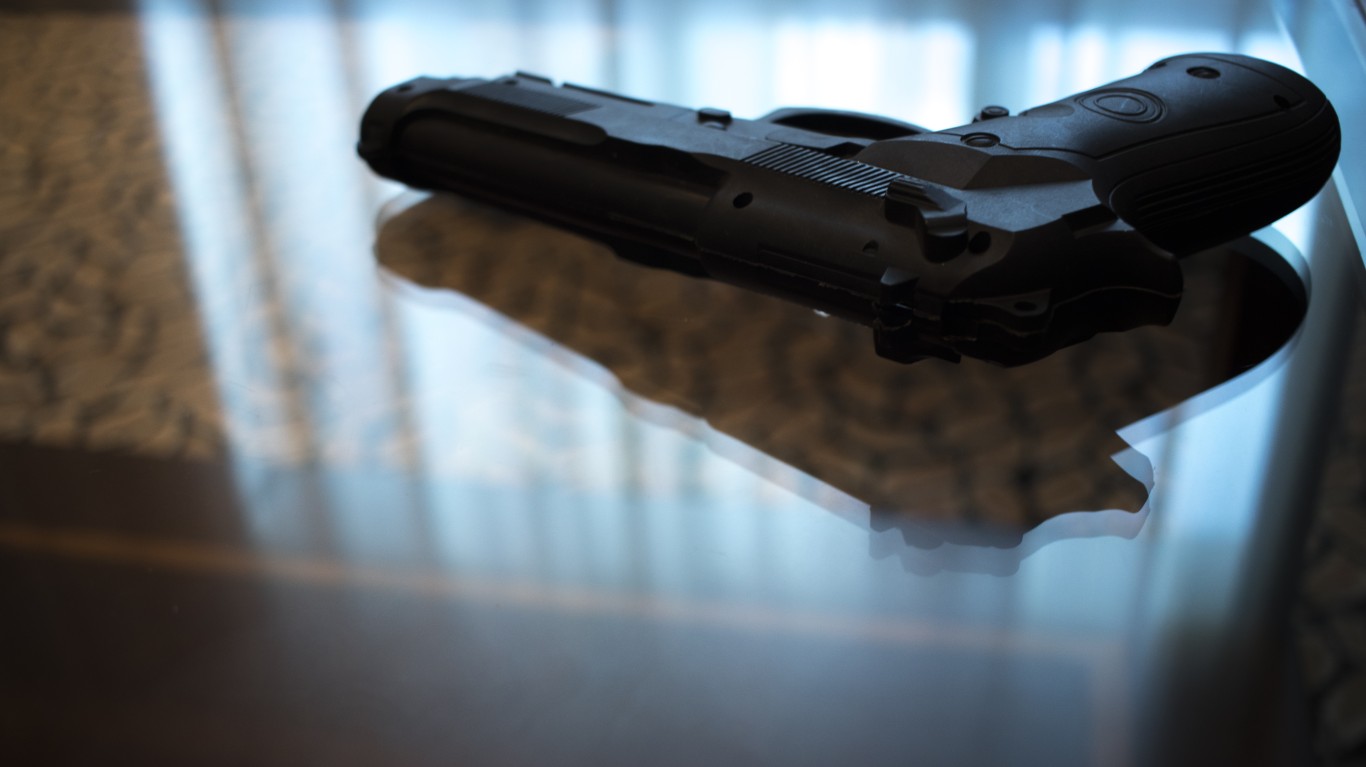
US firearm access is linked to higher suicide risk
American gun owners are at a higher risk of suicide than non-gun owners. A study published by the Harvard School of Public Health found that those who died by suicide were twice as likely to have a firearm in their home than those who attempted suicide and failed and those who never attempted suicide.
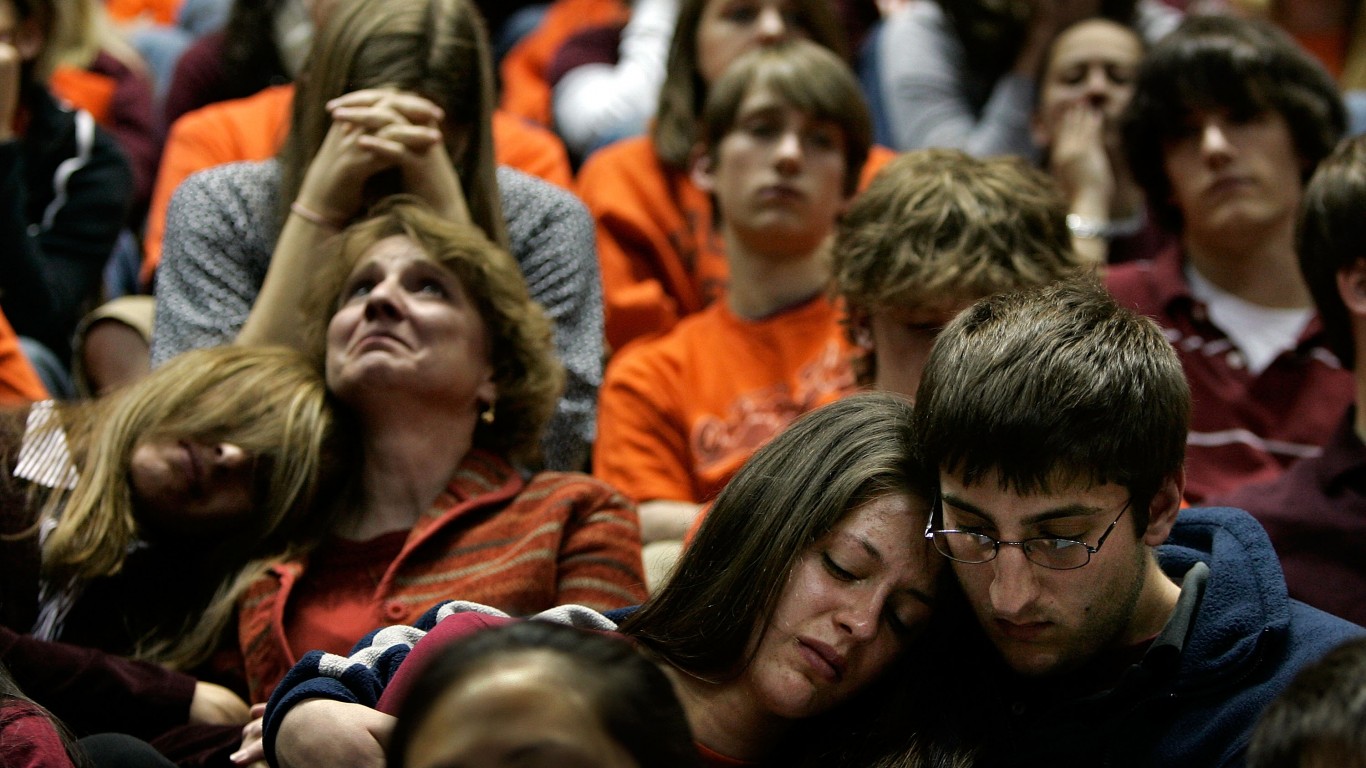
11 states allow concealed carry on school campuses; 16 prohibit it
Some of the worst mass shootings in U.S. history have occurred on college campuses, including the 2007 Virginia Tech shooting, and the 1966 shooting at the University of Texas. As of 2020, only 16 states expressly prohibit the concealed carry of firearms on campus (with exceptions made for official security personnel), while 11 states expressly permit it. In the remaining 23 states, colleges are free to set their own policies around firearms.

As of mid-June, there were 19,530 gun violence deaths in the US in 2023
Though not on pace to exceed totals from 2020, the worst year for gun violence in the U.S., firearm deaths remain near historic highs in 2023.
[in-text-ad-2]
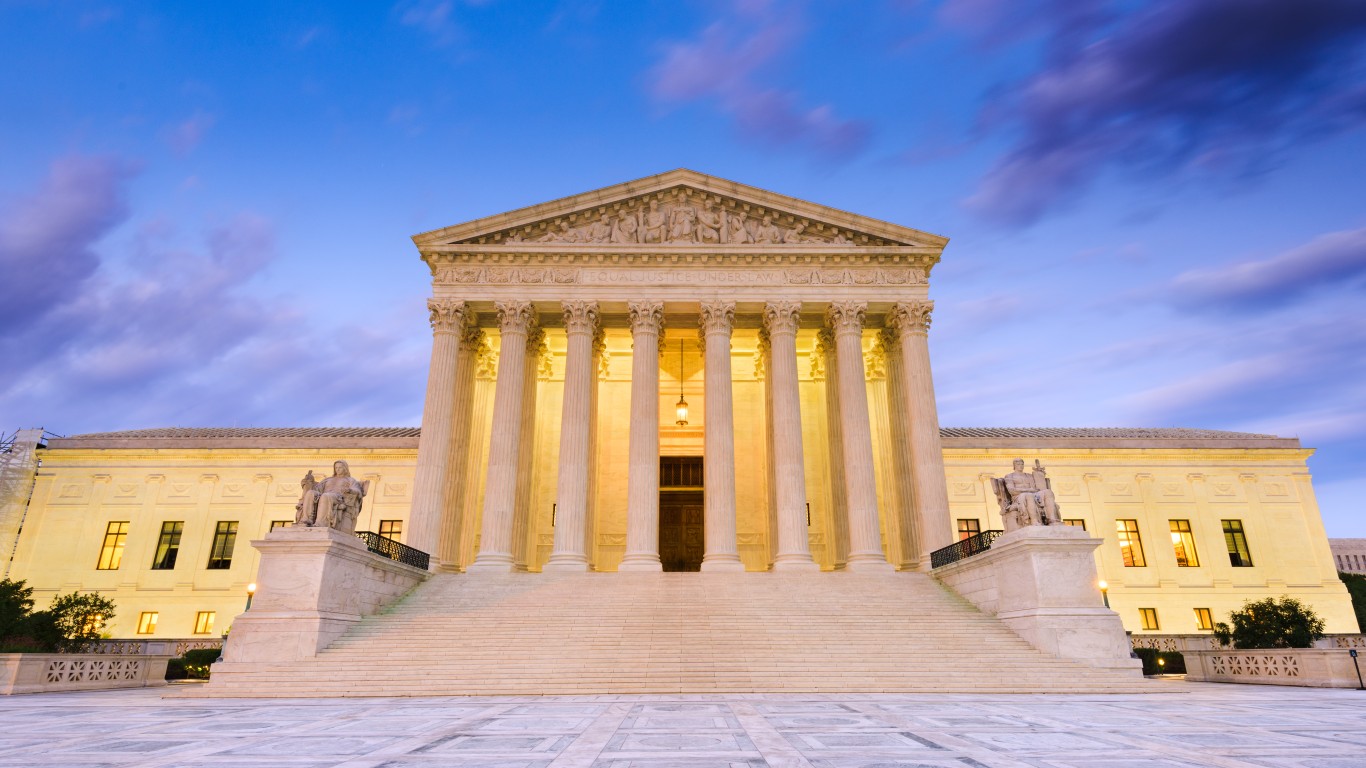
DC’s gun ownership ban was overturned by the Supreme Court in 2008
In 1976, a law effectively prohibited residents of Washington D.C. from owning a handgun. However, in a five to four decision in 2008, the Supreme Court ruled the law was an unconstitutional violation of residents’ Second Amendment rights, and overturned the prohibition. The decision also overturned a law requiring D.C. residents to store their rifles and shotguns unloaded, and either disassembled or under lock and key.

Alcohol is linked to 40% of all homicides – most of which involved a gun
The vast majority of homicides in the United States – 85.7% in 2021 – are carried out with a gun. And about 40% of all convicted murderers in the United States committed the crime while under the influence of alcohol.
[in-text-ad]
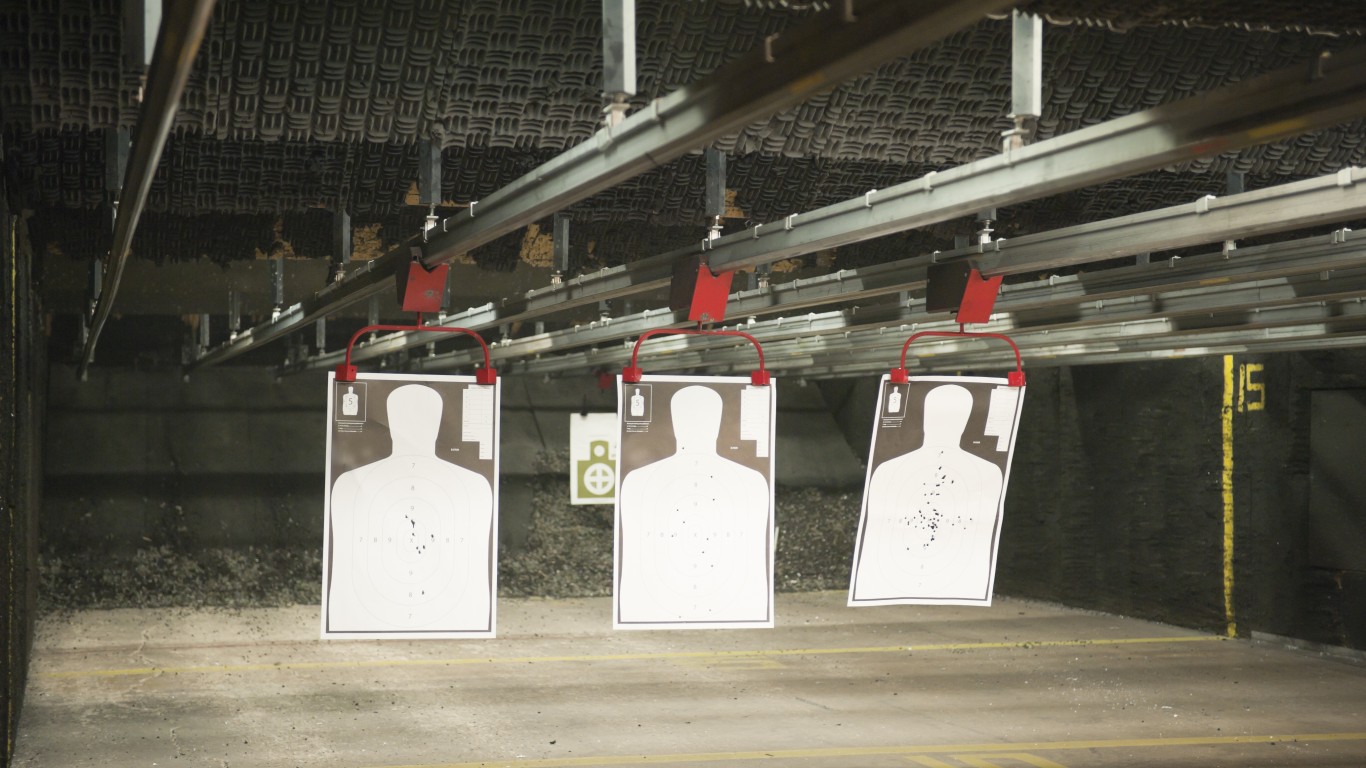
49% of gun owners have majority of gun-owning friends
Firearms are a defining feature of many social circles in the United States. A Pew study found that 49% of American gun owners say that all or most of their friends also own at least one firearm.
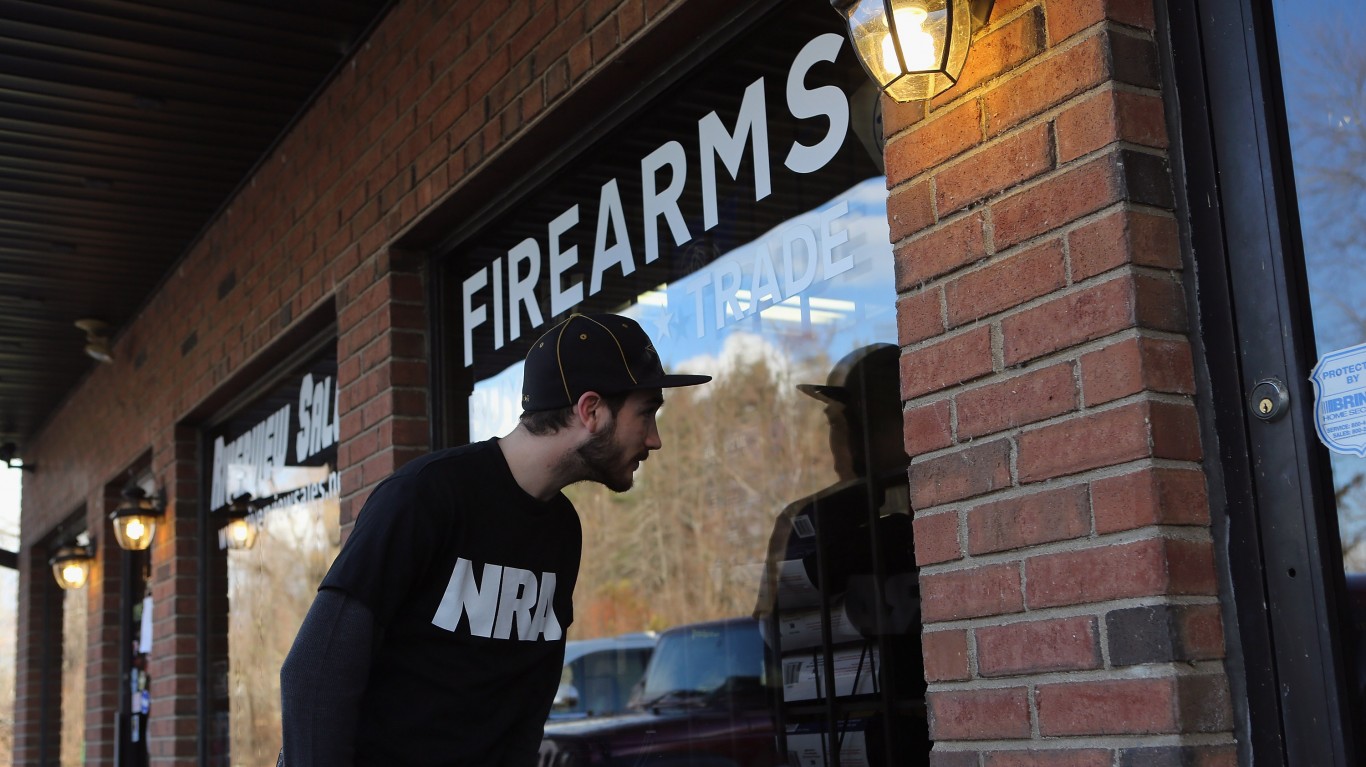
1 in 5 gun owners belongs to NRA
The National Rifle Association, or NRA, is the most powerful gun rights lobbying group in the United States. About one in every five gun owners in the U.S. reports being a member. The non-profit charges $45 for one year of membership and offers discounted rates for longer term commitments.
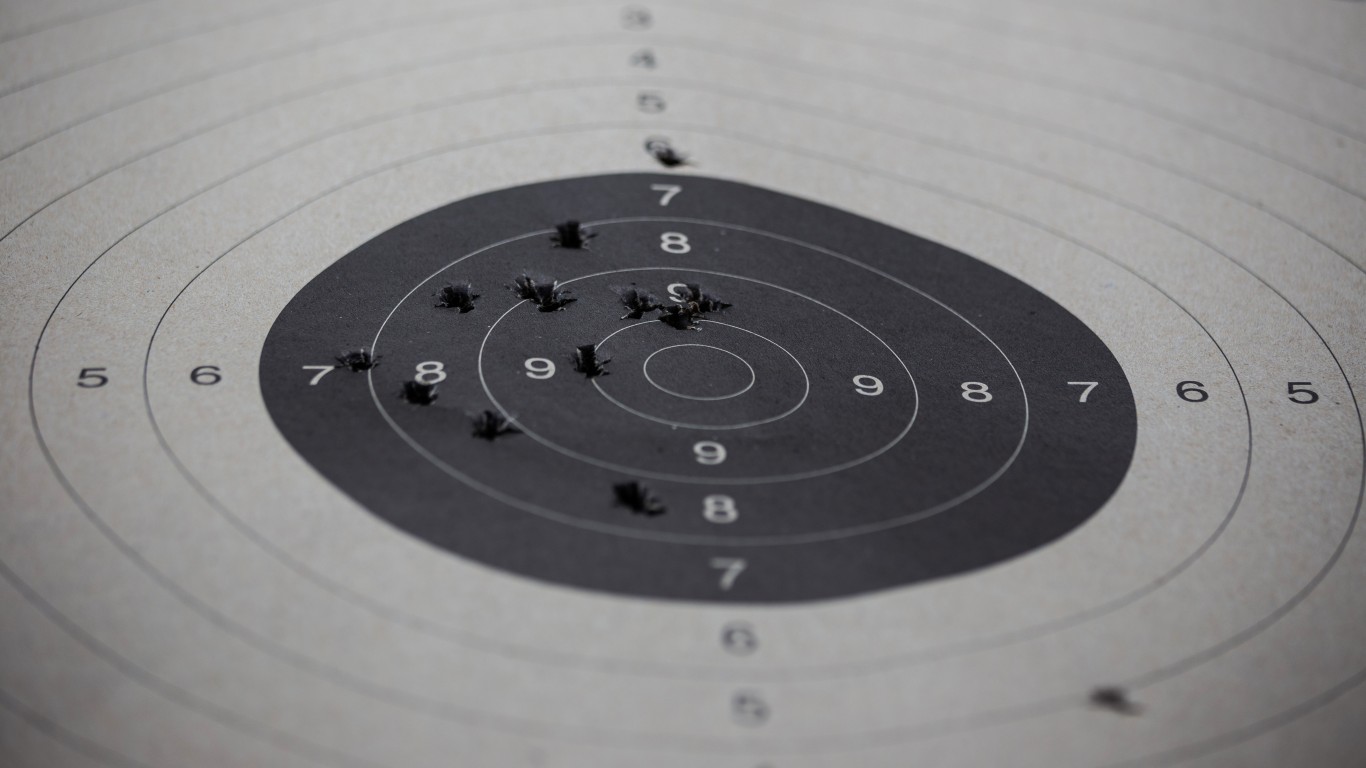
Younger gun owners prefer gun range or shooting club memberships
Older gun owners are less likely to belong to a gun range or hunting club than their younger counterparts. According to a Pew study, 18% of gun owners ages 18 to 49 are members of a gun range, double the 9% share of gun owners 50 and older who are. Similarly, 13% of gun owners between 18 and 29 belong to a hunting club, while only 3% of gun owners over age 30 do.
[in-text-ad-2]
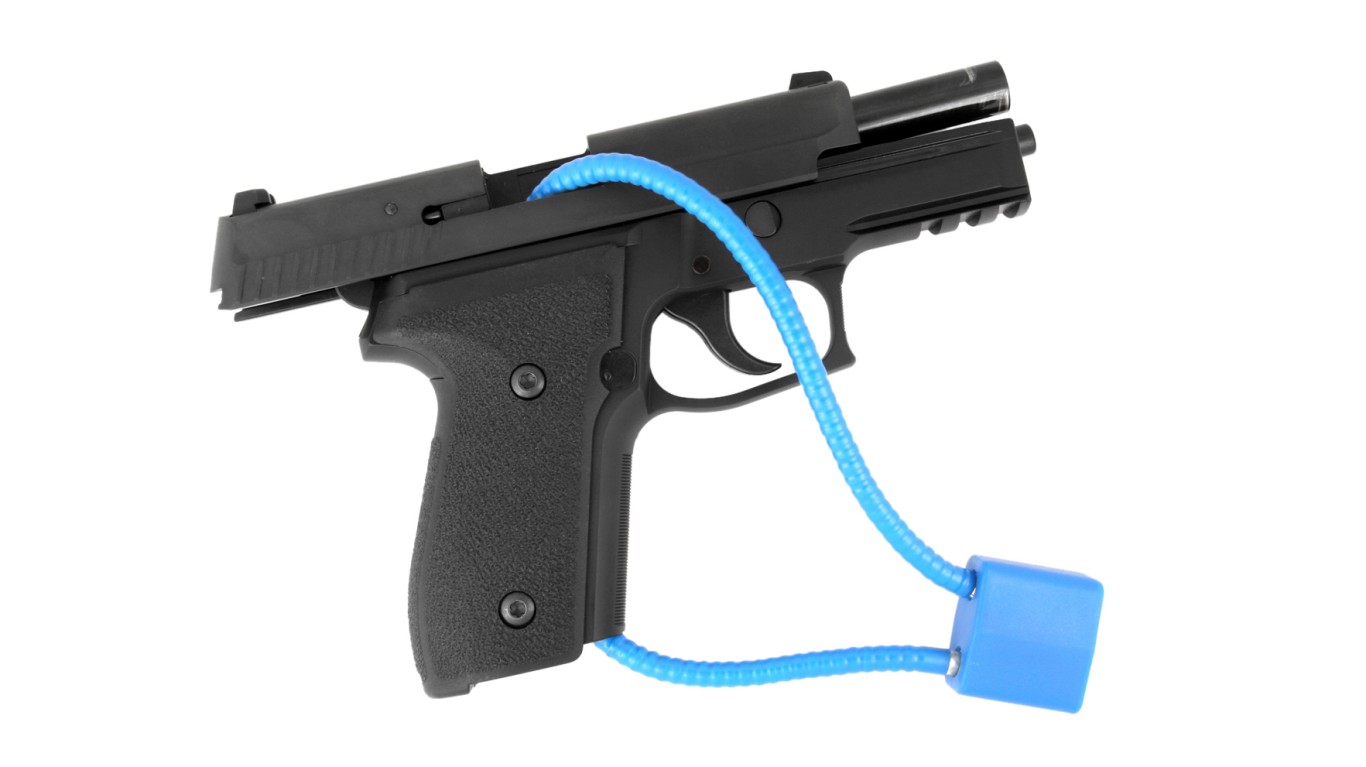
70% of gun owners have completed gun safety courses or training
The majority of American gun owners have a demonstrated commitment to firearm safety. According to the Pew Research Center, about 70% of gun owners have taken a training course in hunting or firearm safety. It is important to note that in much of the country, safety classes are a prerequisite for legal ownership of certain firearms.
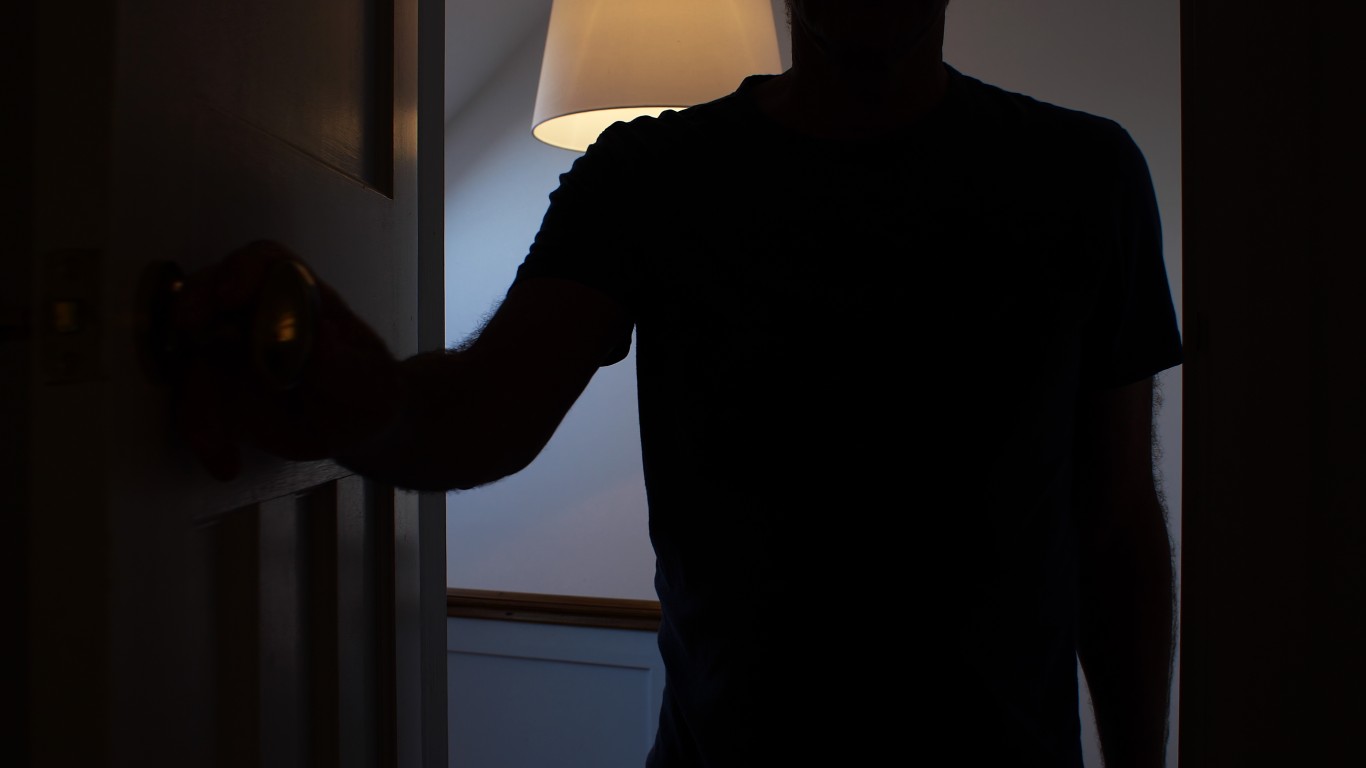
Partner gun ownership increases risk of murder for abused women 5x
A study published by the American Journal of Public Health found that women who live with an abusive partner are five times more likely to be murdered if that partner has a firearm.
[in-text-ad]
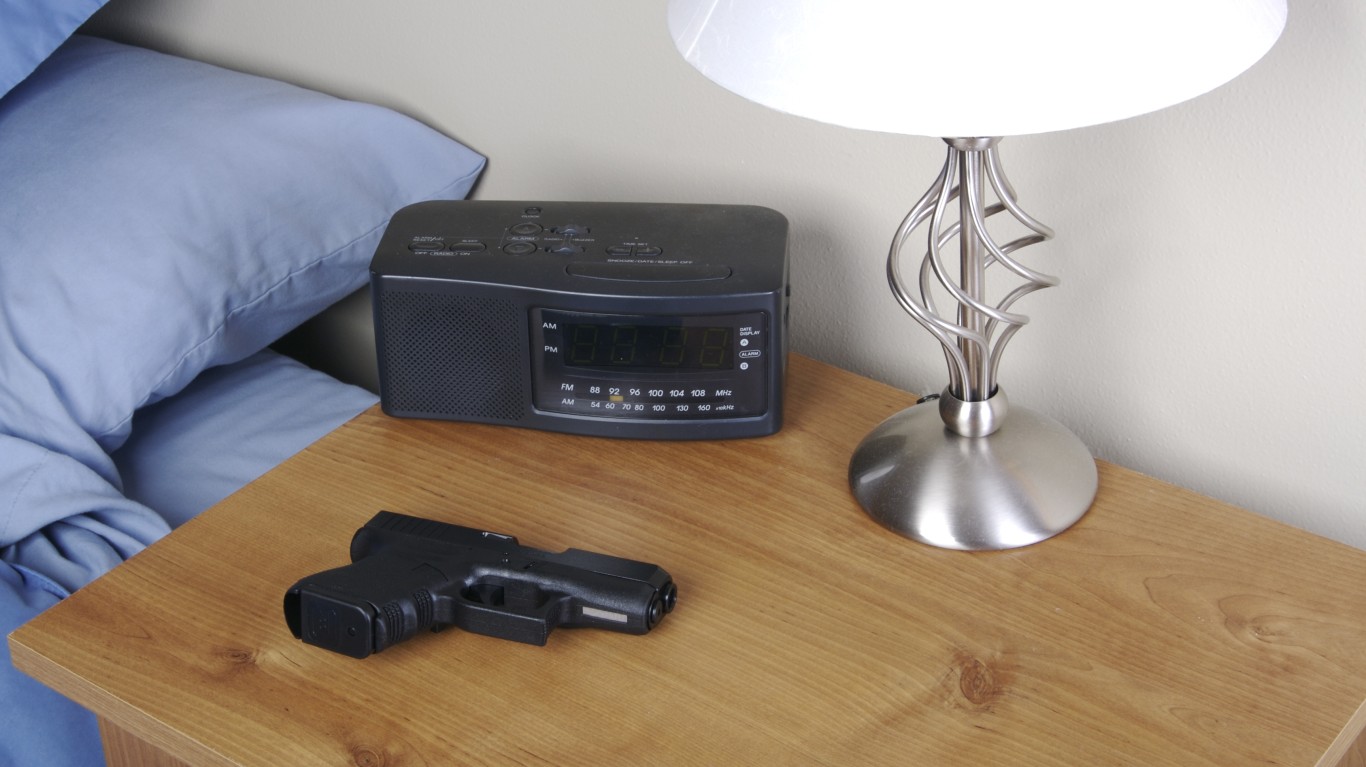
Handguns accounted for 59% of U.S. gun murders in 2020
Handguns, such as revolvers and semi-automatic pistols, are more likely to be used in homicides than long guns, like rifles or shotguns. According to the FBI, of the 13,620 gun murders in the U.S. in 2020, 59% were committed with a handgun.
Is Your Money Earning the Best Possible Rate? (Sponsor)
Let’s face it: If your money is just sitting in a checking account, you’re losing value every single day. With most checking accounts offering little to no interest, the cash you worked so hard to save is gradually being eroded by inflation.
However, by moving that money into a high-yield savings account, you can put your cash to work, growing steadily with little to no effort on your part. In just a few clicks, you can set up a high-yield savings account and start earning interest immediately.
There are plenty of reputable banks and online platforms that offer competitive rates, and many of them come with zero fees and no minimum balance requirements. Click here to see if you’re earning the best possible rate on your money!
Thank you for reading! Have some feedback for us?
Contact the 24/7 Wall St. editorial team.
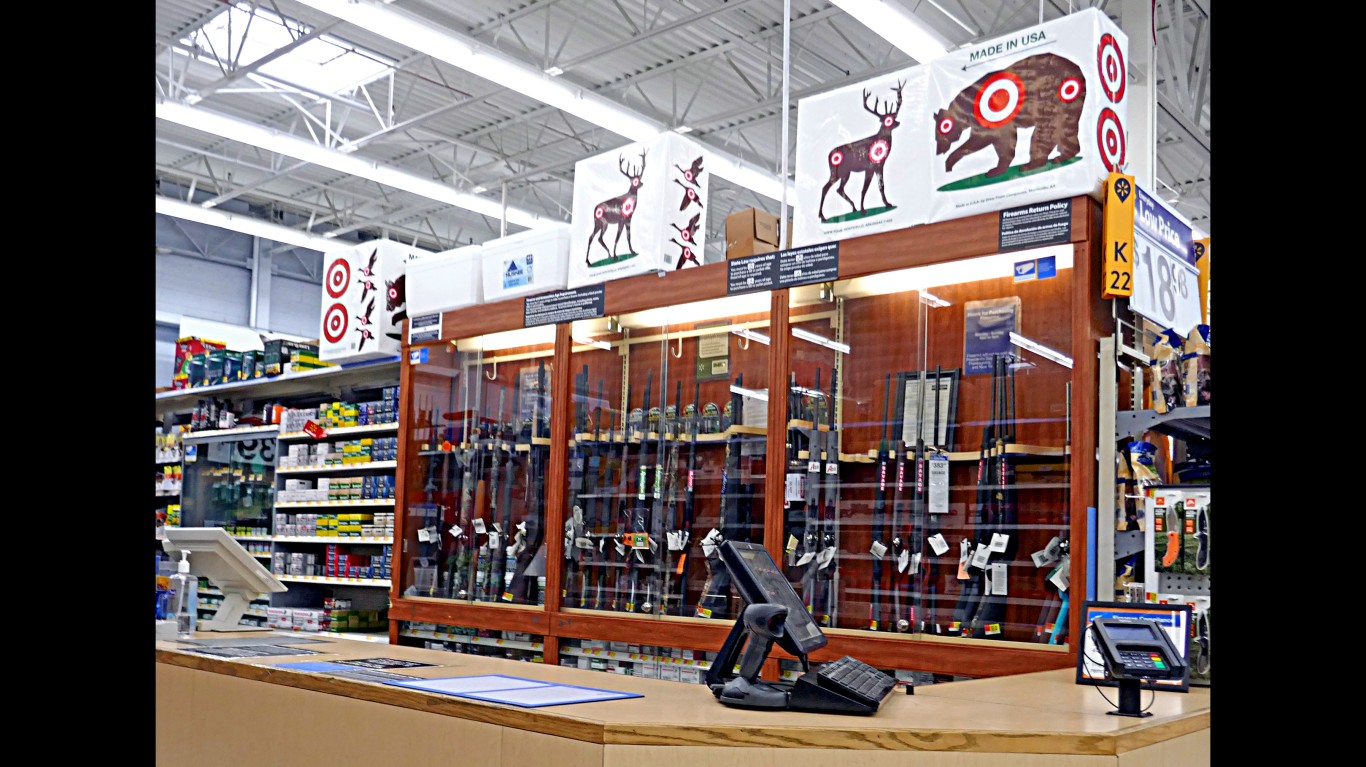
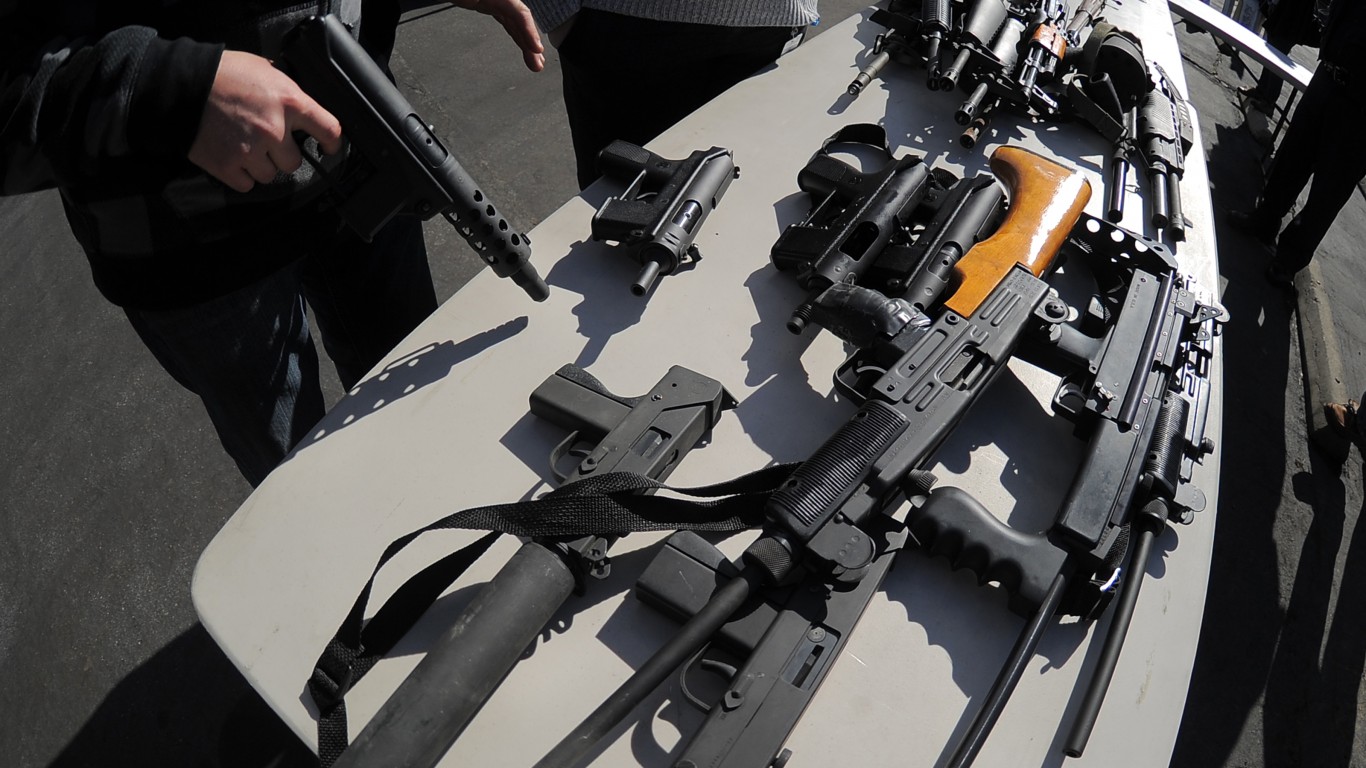 24/7 Wall St.
24/7 Wall St.